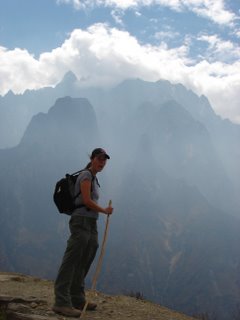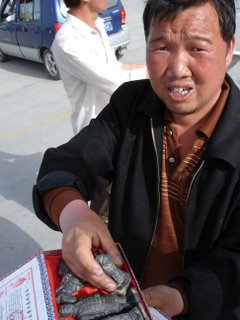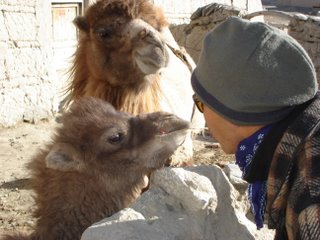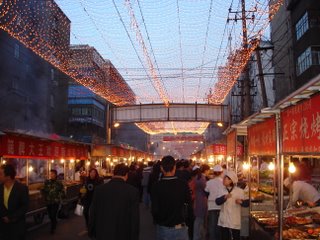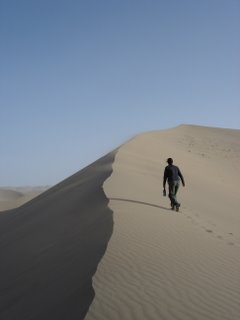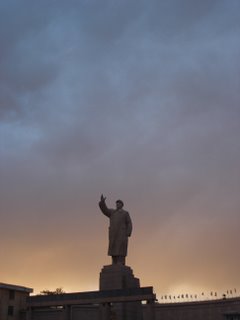
Karsts Karsts Karsts
Best to leave the photos to describe Yangshuo, one of the prettiest places we saw in China. The landscape is dominated by these spectacular, eerie limestone hills, aka "karsts." We spent a day cycling up and down the river and got lost in the rice paddies. We fortunately stumbled upon some Chinese tourists from Guilin, the nearby big city, who spoke English and helped us find our way out of the muddy maze. It's a refreshing change from big city China - really easy to get to the countryside, but the main drag offers Western amenities for the weary traveler.

The karsts also make Yangshuo a climbing paradise, with tons of well-protected sport and trad routes all over the place. We spent half a day with a guide and two Canadians at a great shady crag (see photo, crag on left). My forearms have shrunk to nothing, and I struggled to onsight a 5.8+, fell off a stiff 5.9, and abandoned a technical 5.10b midway. All this on top rope. Pathetic.
 Teaching
TeachingWe also spent two days volunteer teaching at local elementary schools in the countryside. Here you see Leslie, a former pro hockey player from Canada and organizer of Volunteer English Teachers: http://www.guilin-yangshuo.com/VET/index.html
It's a slapdash, but worthwhile affair. Leslie picked us up at a street corner and headed directly to the school. We prepped briefly in the car, and next thing you know, Jen and I were in front of 20 squirrely 4th graders armed only with flash cards. Despite the madness - and it was madness - it felt good being in front of a class again. The good old buzz kicked in immediately. Teaching just feels like second nature. I also found I could still give kids "the look" to quiet them down. Here's a shot of the kids from the second day, who were dramatically more attentive.

Unfortunately, Leslie is the first to admit that while his program leads to higher test scores, and the kids benefit marginally from hearing native speakers (their regular English teachers speak no English), the students are not learning any real English. Even the most advanced students, who have been at it for three or four years, can't read, write, or put together a sentence. They can however recognize many household nouns - shoes, cat, dog, horse, chicken, dress, etc. - the same way a beginning Chinese student can recognize characters. In addiiton, they can tell time (as long as it's at the top or bottom of the hour) and tell you what the weather is. Their poorly equipped teachers and the short term nature of the volunteers really makes it impossible to learn English in this environment. To be honest, while the experience was a lot of fun for all, I felt the volunteer teachers got more out of it than the kids.

Caving
On our last day in town, we rented a scooter and headed out to the Water Caves. Here's me in the mud bath.
 Epilogue
EpilogueWe spent a couple of days in HK with my parents, shopping, enjoying the swank hotel room, and eating ridiculously well. GREAT dim sum. PAINFULLY spicy Sichuan food. The prawns were literally buried under a pile of peppers. Then a week in Manila. More shopping and eating, seeing family, three days at the beach, a fun pick up ultimate game. (Ultimate is huge here, with 95% locals.) We're headed back this afternoon.
Last Words
It amazes me every time I tell someone that we've been on the road since November. The first half of our trip has faded into a fond memory. Strangely, I'm not too concerned about readjusting to life back home. Honestly, given the opportunity to travel one more month, I wouldn't take it. (Well, OK, I'd jump on a chance to go bike touring in Italy and France.) All in all I'm truly satisfied with our trip and I'm ready to go home. Sure, having regular responsibilities will be jarring, but I look forward to seeing our house and friends, riding my bike, cooking in our kitchen. My friend's bachelor party is at the end of July in Mexico, and he's getting hitched in September, so there's more fun stuff in the future.
The last month has worked well as a transition into normal life. Big city China got us access to Western life, we saw old friends and hung out with non-backpackers, and Manila is familiar territory.
I know a couple of people are reading this while planning for a similar trip of their own. Please indulge me in offering a couple of things we learned along the way:
1. Find your comfort zone, then foray out of it every so often. At first I felt like we weren't really "traveling" unless we stayed at the crappiest hotel rooms, ate the sketchiest food, and roughed it on the most arduous treks. We soon found that we're more moderate backpackers, and that lifestyle was just unsustainable for seven months. At the same time, the expriences that will stick with me are the maggot infested toilet in Peru, the altitude sickness in Tibet, and sleeping with the Kazakh family in a yurt.
2. Keep a flexible schedule. Pre-booking can ease the mind, but will cramp your style if done in excess. In general, if you're in an area that's even moderately well-traveled, someone there can offer you the necessary service at a better price than a pre-arranged deal. With a flexible schedule, we could decide to go to Antarctica on a whim!
3. Take all advice, including this, with a grain of salt. The bad info/good info ratio in the backpacker network is probably 3 to 1. Best to sort things out on your own, while harvesting the nuggets of truth. The Lonely Planet Thorn Tree forum can be useful here. Just check out their website.
4. If you suspect you're carrying too much stuff, you're right. Especially in hot weather countries, you need very little to live happily. No need for sleeping bags in SE Asia or China. A silk or cotton liner might be nice, though, not really necessary. Unless you already have a bunch of good trekking gear you want to use, best to buy the cheap stuff while on the road, then ditch it as you go. Getting cheap gear in S America is more difficult, though.
Some key items I liked on the trip:
a. Hiking boots - we did a lot of trekking and I would hate to use cheap local brands or knockoffs. Heavy, but worth it for me.
b. Flip flops - Although they're real popular with backpackers, I think sport sandals look dumb. Flip flops are lighter, cooler, c. and more convenient to slip on and off.
d. LED Headlamp - for reading on overnight buses and trains, dorms, dark rooms in Tibet, trekking, etc. Light and lasts forever.
e. Tiger Balm - helps with nausea, bad odors, muscle problems.
f. Watch with a loud alarm - no need for a separate alarm clock if your watch can wake you up.
g. Sturdy water bottle - avoid excess buying and tossing of disposables.
h. Rechargeable AA batteries for camera - Electricity is widely available, so it's easy to recharge camera batteries. It's way more conveninent and cheap and avoids waste. If your camera doesn't accept AAs, bring at least one spare, two if you're in uncharted territory.
i. Ipod - I wasn't too concerned about breaking or losing it since it's a really really old model. Great on bus rides where it's too bumpy or windy to read. A headphone splitter jack is nice if there are two of you.
j. Guidebook - No matter how much "hardcore" backpackers may spurn this, I think it's really really helpful, particularly if you don't speak the language. For one, having a basic map of almost any major city is invaluable. I don't have much to say on the Rough Guide vs. Lonely PLanet debate. Either is fine. You can buy cheap knockoff copies if you happen to swing by Bangkok. Thanks to Sam and Dan for buying us all the Lonely Planets on our wedding registry!
k. Memory stick USB thingy - We got a USB thumb drive you can plug the digi cam memory stick into. This device lets you download pics onto a hard drive. This was invaluable in internet cafes without memory card readers.
5. You will get burnt out on a long trip. Don't worry about it. Treat yourself, relax, shake things up, and be patient. Things will pick up again.
I hope you guys have enjoyed reading this as much as I've enjoyed writing it! Bye!





